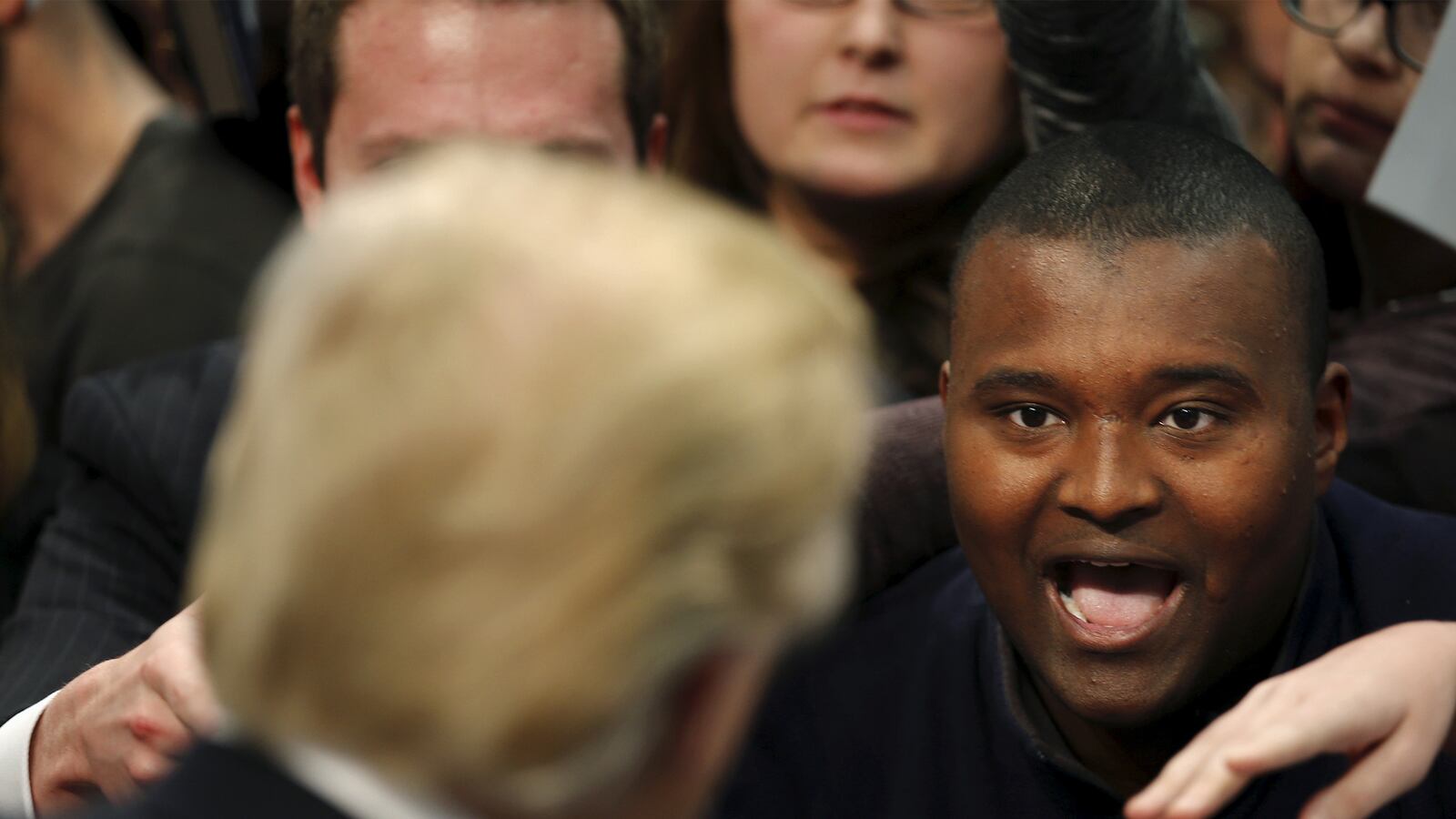While countless Republicans are lamenting how Donald Trump is destroying their party, it’s possible he just may end up saving it. Because in the last few weeks, The Donald has finally managed to do something no other Republican—or Democrat—has. He’s forced the Republican Party to acknowledge and confront the wide swath of bigotry and intolerance plaguing the party. When the dust clears Donald Trump will likely cost Republicans the White House in 2016. But he may just clear the path for a new beginning between Republicans and minority voters for future elections.
There have been numerous troubling incidents in which black anti-Trump protesters have been verbally harassed and physically assaulted at Trump events.
Not to mention other racially charged moments involving his supporters, such as one recently photographed offering a Nazi salute (which she later claimed was not because she holds Nazi beliefs.) And then there was the violence that shut down a Trump event in Chicago. As the outlandish behavior has escalated, more and more Republicans are feeling compelled to denounce it. But for many of us the question is, what took your party so long?
Though Republicans like to trumpet the moniker “the Party of Lincoln” (i.e. “We’re the party that freed slaves”), it hasn’t been that in a long time. Despite the best efforts of some modern-day Republicans to rewrite history, the truth is the suspicions many minorities hold toward Republicans come from a legitimate place. As outlined by John Nichols in his piece “When Republicans Really Were the Party of Lincoln,” the Civil Rights era was a key turning point in the relationship between Republicans and black voters.
Southern Democrats like Strom Thurmond abandoned the Democratic Party because of President Johnson’s civil right efforts (despite Thurmond having fathered a black child himself), while Republicans who supported such efforts were displaced by a new brand of Republican; Republicans like Richard Nixon and others who would rely on a so-called Southern strategy that preyed on the resentments of angry white voters and convinced them that their problems could be blamed on a changing America that was benefitting brown voters at their expense.
Sound familiar?
Though former Republican National Committee Chair Ken Mehlman formally apologized to the NAACP for relying on the Southern strategy in previous elections, for many black voters the image of the Grand Old Party as Grand Old Racists has been hard to shake. That has only grown truer since President Obama took office. While there are plenty of conservatives who simply don’t agree with the President’s policies, there are others whose contempt for him has been tinged with racial undertones—and in some cases blatant overtones.
There was Southern Republican Congressman Geoff Davis (yes, ironically he sort of shares a name with the President of the Confederacy) who referred to the President as “boy,” a term of denigration historically favored among white Southerners to remind black men that they were not in fact men in their eyes. There was the Republican mayor who shared watermelon jokes about the White House following the President’s election. The list goes on. (Literally—here is a list just from the President’s first year in office.)
But through it all, a common narrative prevailed among the Republican establishment that they continued to relay to black Americans—and all voters of color. “We’re welcoming. We’re inclusive. Just like any family we have a few bigots, but they are few and far between.”
Thanks to Donald Trump, however, now they know and we know that the bigots are not few and far between, but in fact comprise a significant portion of the Republican electorate. David Duke’s endorsement, The Donald’s struggle to denounce it and his supporters’ ambivalence about it all, combined with recent racially charged violence, have proved just how terrifyingly bigoted some of them really are. That’s depressing but for some of us minorities it also represents a cause for celebration. Here’s why.
There’s a saying: “Just because you’re paranoid doesn’t mean they’re not after you.” For a long time minority voters who expressed suspicion that racism was prevalent within the GOP were dismissed as paranoid intellectual hostages of Democratic propagandists.
Not anymore.
The word racist has been debated, dissected and thrown around so much in the Obama era that it’s almost become meaningless. But at the very least there’s one thing decent Americans of all races and parties seem to agree on, which is that the Ku Klux Klan is racist, and a political candidate who can’t be bothered to run from a Klan-affiliated endorsement as quickly and as far as possible is not someone any party should want as a representative.
The passionate denunciations by Republican leaders Mitt Romney and Nikki Haley and House Speaker Paul Ryan, and recently others, of Trump’s extremist rhetoric and extremist supporters marks a turning point. The GOP has finally stopped being in denial that racism and racists are alive, well and active in the Republican Party and in big enough numbers to sway a presidential election.
Many black Americans knew this. It took Donald Trump, and his supporters, including David Duke, to give establishment Republicans a wake-up call. Now the real test begins. What will the Republican Party do next?
In their desperation to win, will the Republican National Committee go all in and begin another era of the Southern strategy by exploiting the worst fears of Donald Trump’s base to win in 2016? Or do they have the courage to take the high road and do the right thing by reaching out to voters of color and saying, “I’m willing to lose one election to convince you that we are a party worth giving a fair shot to in every election after 2016”?
My selfish hope is that they will do the latter. Because while conducting polling in 2007 for my book Party Crashing, I discovered that unlike our parents, black voters under 40 made up one of the fastest-growing groups of registered independents in the country, something that left me hopeful. Because I’ve dreamed of seeing a presidential election in which both major parties fight for my vote as hard as they fight for the votes of soccer moms, NASCAR dads or whoever the trendy swing voter du jour that election cycle happens to be.
But that won’t happen until the Republican Party purges itself of those within who are still holding up a figurative “Whites Only” sign.






